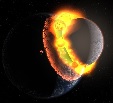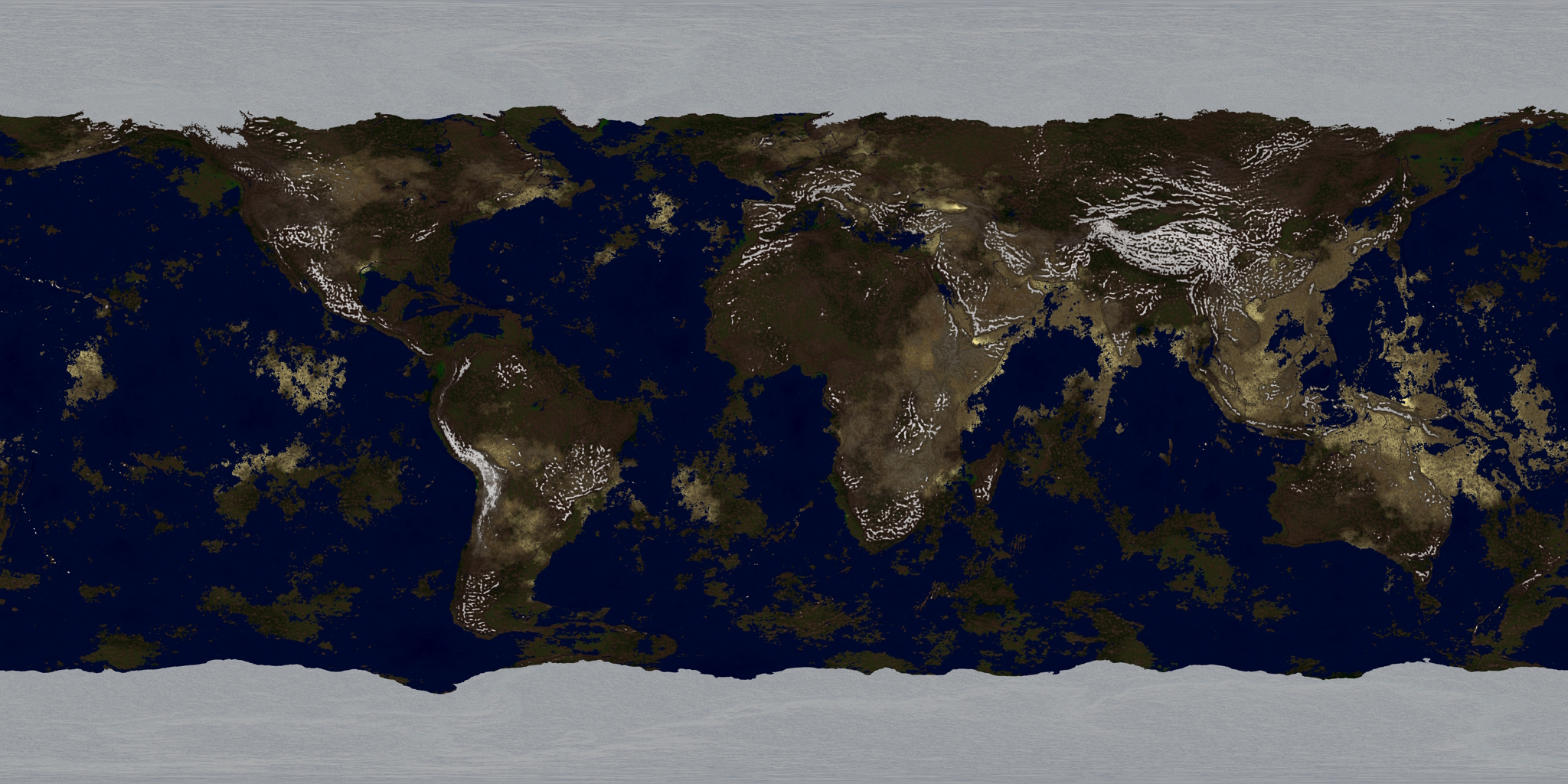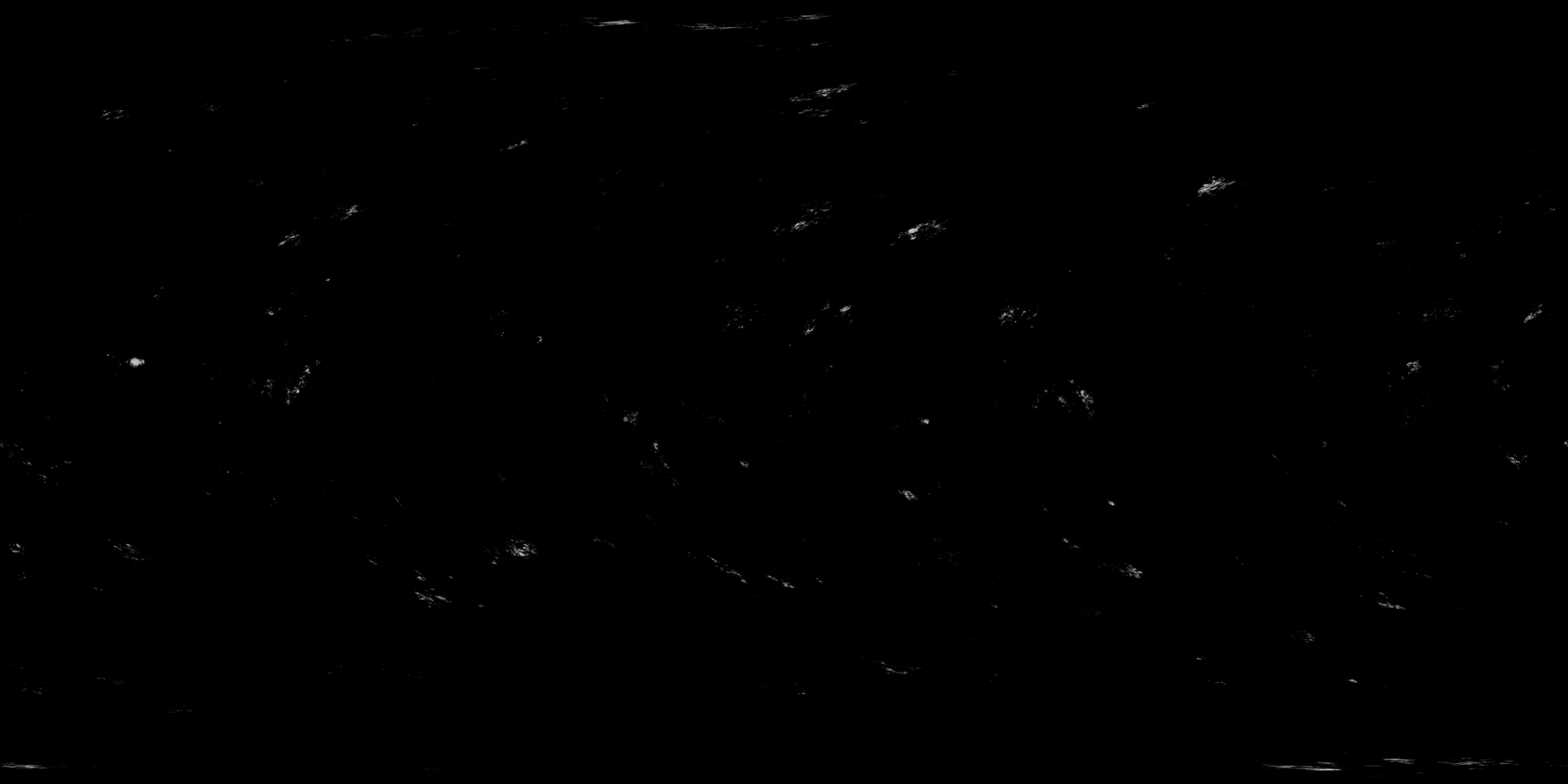|
If Earth had less water...
|
|
| Diakonov | Date: Sunday, 14.02.2016, 01:33 | Message # 1 |
|
Astronaut
Group: Users
 Brazil
Brazil
Messages: 69
Status: Offline
| Hi, I'm posting an interesting thread about what would be Earth if it had less water on the surface. It's based on Planetocopia website about other versions of Earth and other planets:
http://www.worlddreambank.org/S/SIP.HTM
Here's what I think Earth would look like. It would not be Earth anymore, but something different... Gaia.

Here's the original image link: http://oi64.tinypic.com/295v2u8.jpg
Earth would have more countries, and maybe even more intelligent species. Our coastal areas would be some kilometers high and our high mountains would be martian in environmental conditions. The air pressure at sea level should be higher, at least 3x our atmosphere. Amazonia would be temperate in it's climate and Himalaya would be martian. The artic ocean would be isolated from the others, as a huge sea. The tropical forests would be the land that is actually underwater. Saara would be a very cold place, a very cold desert. The oceans would be less deep and most part of it would have high biodensity, maybe allowing intelligent aquatic life to develop.
Earth would be better planet if it had less water in excess and higher air pressure... Or wouldn't be?
The temperature at sea level, even on poles, due to higher air pressure would be at around 30 to 50°C. But the higher mountains at huge glaciers cold forever would compensate, avoiding an unbalanced greenhouse. Earth would be hotter, we would be adapted to it, and the more rugged crust would keep temperature balance. At such high pressure, water would only boil at 137°C. So the oceans will never evaporate as some think ocurred on Venus.
Edited by Diakonov - Sunday, 14.02.2016, 01:48 |
| |
| |
| apenpaap | Date: Sunday, 14.02.2016, 17:52 | Message # 2 |
 World Builder
Group: Users
 Antarctica
Antarctica
Messages: 1063
Status: Offline
| Correct me if I'm wrong, but don't the continents and oceans look like they do partially due to the presence of the sea in the first place? I remember reading there were no real continents and oceans on early Earth, just large islands and seas, and billions of years of water erosion caused the thinner crust in large areas that allow oceans to exist, and also continents. Where I'm going with this is that I doubt the Earth's water would actually be distributed as it is on that map if there was much less of it. I feel like it would be more likely to all gather into a single ocean after some time, leaving the rest of the world dry land. I'm not sure about any of this, by the way, and would love to hear the thoughts of someone better versed in geology.
Either way, I don't think a world with less water would be such a pleasant place. With smaller oceans, there's less evaporation, and thus less rain. The rain that does fall would probably not reach very deeply into the huge continents. I think you're correct about the tropical forests mainly occuring on land that's underwater on real!Earth, but I think the picture would be less pleasant in the inner parts of the continents. With very little water ever getting that deep into the inner lands, most of it would probably be dry wasteland with very little life. Earth might have more land, but little of it would be habitable with so little water. Similarly, I don't think water would ever get up onto the mountains to form the huge glaciers you're talking about. And if it does, I wonder if between the larger polar caps and the glaciers that would form on large parts of the highlands in this scenario all the sparse water of the planet wouldn't end up frozen in glaciers. If that doesn't happen, however, shallow oceans could probably indeed allow for more diverse marine life, more coral reefs and such.
I occasionally stream at http://www.twitch.tv/magistermystax. Sometimes SE, sometimes other games.
|
| |
| |
| parameciumkid | Date: Sunday, 14.02.2016, 20:47 | Message # 3 |
 Explorer
Group: Users
 United States
United States
Messages: 277
Status: Offline
| Also, contrary to what fundraising propaganda sometimes claims, the primary oxygen producers on Earth are not on land but in the ocean in the form of cyanobacteria. With less water, there is less habitat for these, so Earth's atmosphere would likely have less oxygen in it. That could be bad.
Intel HD Graphics 4000 ;P
|
| |
| |
| Alek | Date: Sunday, 14.02.2016, 21:53 | Message # 4 |
 Pioneer
Group: Users
 United States
United States
Messages: 326
Status: Offline
| Yes, actually, most sea floor features wouldn't exist they way and in the places they do if Earth had less water, but all would probably remain the same as far as the shapes of the land besides what's under deep ocean for us, and the water probably wouldn't gather into a single basin, but it wouldn't be in thousands of mini-seas either, more like large seas but not quite oceans.
Living among the stars, I find my way. I grow in strength through knowledge of the space I occupy, until I become the ruler of my own interstellar empire of sorts. Though The world was made for the day, I was made for the night, and thus, the universe itself is within my destiny.
|
| |
| |
| Diakonov | Date: Monday, 15.02.2016, 01:39 | Message # 5 |
|
Astronaut
Group: Users
 Brazil
Brazil
Messages: 69
Status: Offline
| But as far as I know, large portions of the oceans don't have algae, they are sea deserts, there are places on oceans almost absent of life. Between the surface and sea floor, there's a region where life is less present. With less water on oceans, most part of them would be shallower, allowing a higher concentration of algae. I think the oceans on Earth are too much deep. If oceans were less deep, marine life would be more abundant. Here's a modified version of the map:

This map might be a bit more realistic approach. Now the highest peaks are absent of ice, but ice glaciers still exist on some altitude range, remember, the air pressure is higher and it's more humid than our air. Don't forget that the interior have many rivers, many of them coming from the glaciers, so even there's not much rain in those regions, there's still a source of water. The seas are so shallow that in some parts you can actually see the sea floor. Imagine such seas with many hydrothermal vents plus a source of light! Certainly they will have much more concentration of algae than our oceans. This version of Earth will have a higher concentration of oxygen, plus the denser air. And no polar caps since the air in a 3 atm atmosphere will be more distribited. This will make the poles much hotter.
Gaia would have some intelligent avian, terrestrial and marine creatures.
Edited by Diakonov - Monday, 15.02.2016, 01:43 |
| |
| |
| Alek | Date: Monday, 15.02.2016, 02:44 | Message # 6 |
 Pioneer
Group: Users
 United States
United States
Messages: 326
Status: Offline
| I've made a couple maps of my own, and honestly in the site you posted it meantioned that cloud cover would be lessened and I agree, so along with a surface map I'll post a cloud-cover map.
Surface:

Cloud:

Living among the stars, I find my way. I grow in strength through knowledge of the space I occupy, until I become the ruler of my own interstellar empire of sorts. Though The world was made for the day, I was made for the night, and thus, the universe itself is within my destiny.
|
| |
| |
| Watsisname | Date: Monday, 15.02.2016, 06:12 | Message # 7 |
 Galaxy Architect
Group: Global Moderators
 United States
United States
Messages: 2613
Status: Offline
| Without simulating this world with a full-scale global climate model, including details of the ocean-atmosphere-cryosphere-biosphere interactions, and general circulation (especially with the new topography), the only predictions I would trust are the new atmospheric pressure profile, and that the old continents would be desolation. Beyond that? I don't have a clue what this planet would look like.
In particular, I'd want to know how the ocean circulation would change. The thermohaline circulation is crucially important to the global climate as well as for the transfer of oxygen and nutrients throughout the ocean. How would this be affected if you make the oceans very shallow? How do you know it doesn't become stratified and anoxic? A global anoxic ocean could spell disaster for life on Earth. This actually happened -- it was a big part of the Permian mass extinction.

|
| |
| |
| Diakonov | Date: Monday, 15.02.2016, 13:31 | Message # 8 |
|
Astronaut
Group: Users
 Brazil
Brazil
Messages: 69
Status: Offline
| Why the polar caps if the heat is more distributed, I mean, with higher air density and also more greenhouse gases, ice would only exist in the higher regions, not in the higher latitudes. The temperature of Earth, don't forget, in my model, is around 30°C to 50°C, depending on the region, but obviously colder in the old continent plateaus. But Alek map is still interesting. It shows a more fertile Earth if the oceans were shallower.
In my second map, green areas have dense forests, purple areas are conifers and yellow and red areas are desert.
Edited by Diakonov - Monday, 15.02.2016, 13:33 |
| |
| |
| apenpaap | Date: Monday, 15.02.2016, 19:58 | Message # 9 |
 World Builder
Group: Users
 Antarctica
Antarctica
Messages: 1063
Status: Offline
| Well, Antarctica would definitely count as the higher regions. In addition to the 4 km height every continent would gain due to the lower sea level, the continent is quite rugged and mountainous under the ice. The equatorial Mount Kilimanjaro shows that even in climates as warm as your Earth would be, ice caps form at heights of 5+ km. Since Antarctica is an entire continent, not just a single, isolated mountain, it would be far more efficient at keeping the heat out. And, warmer Earth or not, it still experiences six months of total darkness a year. If any moisture does get up there, you would almost assuredly get a polar cap on Antarctica.
I'm less sure if there would be an Arctic ice cap as well, but I'm actually inclined to believe there might be one. My reasoning behind this is that the Arctic Ocean is very isolated and enclosed. This is true on real!Earth, but especially on your Earth, where it gets cut off entirely from the other oceans. The continents that surround it are all essentially gigantic mountain ranges of 4+ km tall, blocking off a lot of heat circulation. Even though the ocean itself has dense air at it, that air is probably not going to circulate to the rest of the planet much, which I suspect would mean the small amounts of sunlight the area gets would cool the Arctic ocean down to freezing.
I occasionally stream at http://www.twitch.tv/magistermystax. Sometimes SE, sometimes other games.
|
| |
| |
| Diakonov | Date: Tuesday, 16.02.2016, 03:46 | Message # 10 |
|
Astronaut
Group: Users
 Brazil
Brazil
Messages: 69
Status: Offline
| Ok, that's a very interesting argument. The arctic ocean frozen because of the high mountain ranges around it and due to lack of atmospheric circulation. I think in Gaia the climate in every region would be a lot more local than Gaia having a global climate, because continents would be very rugged. So Gaia would have more variety of climates than Earth.
|
| |
| |
| butterarmyxjrblx | Date: Saturday, 25.06.2016, 01:29 | Message # 11 |
|
Astronaut
Group: Users
 Pirate
Pirate
Messages: 71
Status: Offline
| I know this is one side of the planet, but this is possibly what it would look like:
$IMAGE1$
"You can't spell Challenge without change. You need to change to overcome challenges." -Bo Dallas
|
| |
| |